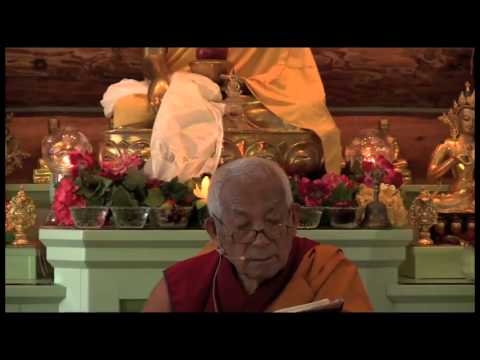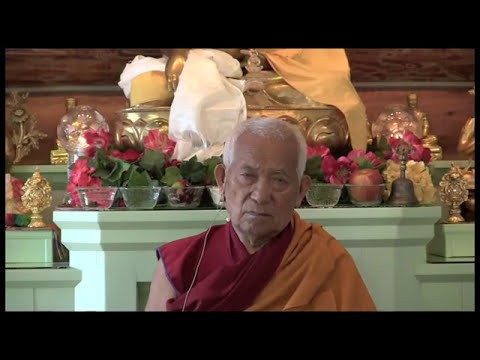Chapter 4: Verses 85–89
Part of a series of teachings on Aryadeva's 400 Stanzas on the Middle Way given on an annual basis by Geshe Yeshe Thabkhe from 2013-2017.
Motivation citing Chandrakirti’s Homage to Great Compassion from Madhyamakavatara
- How attachment to the I and mine is based on misconception of the truly existent self
- Self exists as a dependent arising, in term and concept imputed on the basis of designation – body and mind
- Compassion that sees beings wandering helplessly in samsara clinging to the self misapprehended as truly existing
- Compassion as a response to seeing beings that believe in own permanence
- Compassion that sees beings under the influence of belief in self-existence
Verses 85–89
- Why it is inappropriate for a leader to be arrogant because of being the guardian of the people
- Refuting that punishment of the unruly by a leader is a virtuous action
- Refuting that protecting the people by punishment of the unruly is a religious practice
- Refuting that protecting the people out of attachment is a religious practice
- Violent actions as a source of pride and recklessness
- Why not everything stated in the social treatises is valid
Questions and answers
- Compounded and uncompounded phenomena
- Visualization of the world without attachment and hatred
Geshe Yeshe Thabkhe
Geshe Yeshe Thabkhe was born in 1930 in Lhokha, Central Tibet and became a monk at the age of 13. After completing his studies at Drepung Loseling Monastery in 1969, he was awarded Geshe Lharampa, the highest degree in the Geluk School of Tibetan Buddhism. He is an emeritus professor at the Central Institute of Higher Tibetan Studies and an eminent scholar of both Madhyamaka and Indian Buddhist studies. His works include Hindi translations of The Essence of Good Explanation of Definitive and Interpretable Meanings by Lama Tsongkhapa and Kamalasila's commentary on the Rice Seedling Sutra. His own commentary, The Rice Seedling Sutra: Buddha’s Teachings on Dependent Arising, was translated into English by Joshua and Diana Cutler and published by Wisdom Publications. Geshela has facilitated many research works, such as a complete translation of Tsongkhapa’s The Great Treatise on the Stages of the Path to Enlightenment, a major project undertaken by the Tibetan Buddhist Learning Center in New Jersey where he teaches regularly.


